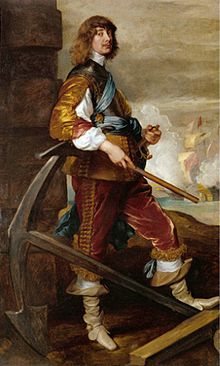
Back الجيرنون بيرسى ايرل نورثمبرلاند العاشر ARZ Algernon Percy, 10. Earl of Northumberland German Άλγκερνον Πέρσι, 10ος κόμης του Νορθάμπερλαντ Greek Algernon Percy (10e comte de Northumberland) French Algernon Percy, X conte di Northumberland Italian アルジャーノン・パーシー (第10代ノーサンバランド伯) Japanese Перси, Элджернон, 10-й граф Нортумберленд Russian Algernon Percy, 10:e earl av Northumberland Swedish Алджернон Персі Ukrainian
The Earl of Northumberland | |
|---|---|
 Portrait by Anthony van Dyck | |
| Lord Lieutenant of Sussex Lord Lieutenant of Northumberland | |
| In office 1661–1668 | |
| Lord High Admiral | |
| In office 1638–1642 | |
| Lord Lieutenant of Cumberland Lord Lieutenant of Westmorland | |
| In office 1626–1639 | |
| Member of Parliament for Chichester | |
| In office 1625–1626 | |
| Member of Parliament for Sussex | |
| In office 1624–1625 | |
| Personal details | |
| Born | 29 September 1602 Essex House, London, England |
| Died | 13 October 1668 (aged 66) Petworth House, West Sussex, England |
| Resting place | Westminster Chapel[1] |
| Spouse(s) | Lady Anne Cecil (? – 1637) Lady Elizabeth Howard |
| Children | |
| Parents |
|
| Alma mater | St John's College, Cambridge |
| Occupation |
|
Algernon Percy, 10th Earl of Northumberland, 4th Baron Percy, KG, JP (29 September 1602 – 13 October 1668), was an English aristocrat, and supporter of the Parliamentary cause in the First English Civil War.[2]
The Percys had been the leading family in Northern England for centuries, and one of the richest, a combination that made them both essential to a stable regime, and dangerous. His ancestors included Henry "Hotspur", who led two rebellions, and died at Shrewsbury in 1405; his great-uncle was executed for treason in 1537, as was his uncle, the 2nd Earl of Essex, in 1601. His grandfather died in the Tower of London, where his father Henry Percy was held from 1605 to 1621. From 1569 to 1630, the Percies were barred from visiting their estates in the North.
This made his support, and that of his cousin, the 3rd Earl of Essex, an important asset for Parliament when the civil war began in 1642. His position as Lord High Admiral also helped secure the Royal Navy, a decisive factor in winning the war.
While contemporaries acknowledged this was driven by a genuine belief in constitutional monarchy, his innate caution meant he could appear unreliable. He supported peace moves in 1643, then the war party headed by Oliver Cromwell, followed by a number of changes in allegiance. The breaking point was his refusal to support the execution of Charles I in 1649. During the 1649 to 1660 Commonwealth of England, he lived on his estates.
Attempts to re-enter politics after the 1660 Restoration failed, although he held several minor positions under Charles II. He died at Petworth House in October 1668.
- ^ "Sir William Waller". Westminster Abbey. Retrieved 11 March 2020.
- ^ Cite error: The named reference
npgwas invoked but never defined (see the help page).
© MMXXIII Rich X Search. We shall prevail. All rights reserved. Rich X Search